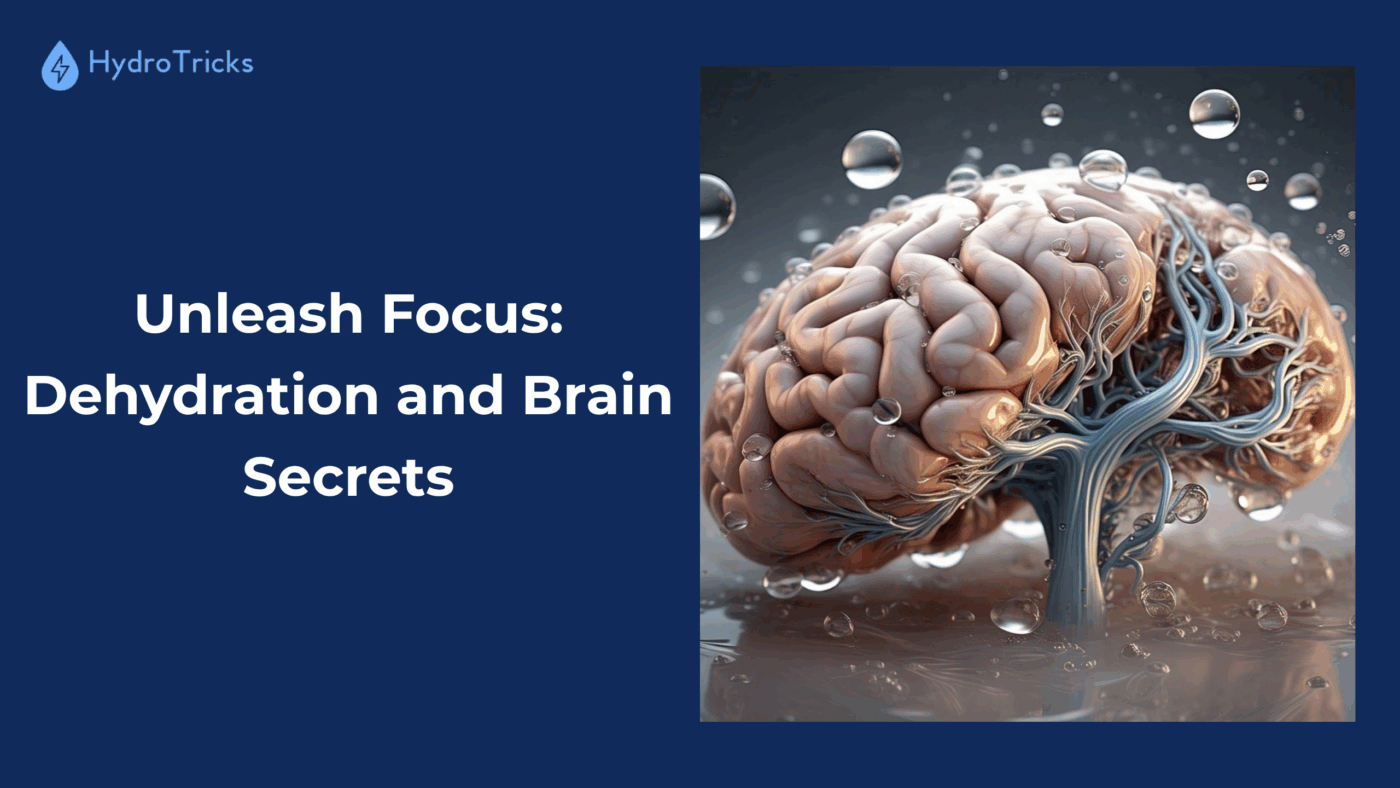In our high-speed digital lives, staying hydrated often falls to the bottom of the to-do list. But if you’re experiencing brain fog, irritability, or poor concentration, the culprit may be more straightforward than you think: dehydration and brain performance are more closely connected than most people realize. The connection between dehydration and brain health is powerful and well-documented. Your brain is made up of approximately 75% water, and even slight dehydration can significantly impact mental performance.
In this comprehensive 2025 guide, we’ll explore the close relationship between dehydration and brain function. You’ll learn how hydration affects cognition, how to spot the signs of dehydration, and the smartest ways to keep your brain fueled and focused.
Why Dehydration and Brain Function Are Closely Connected
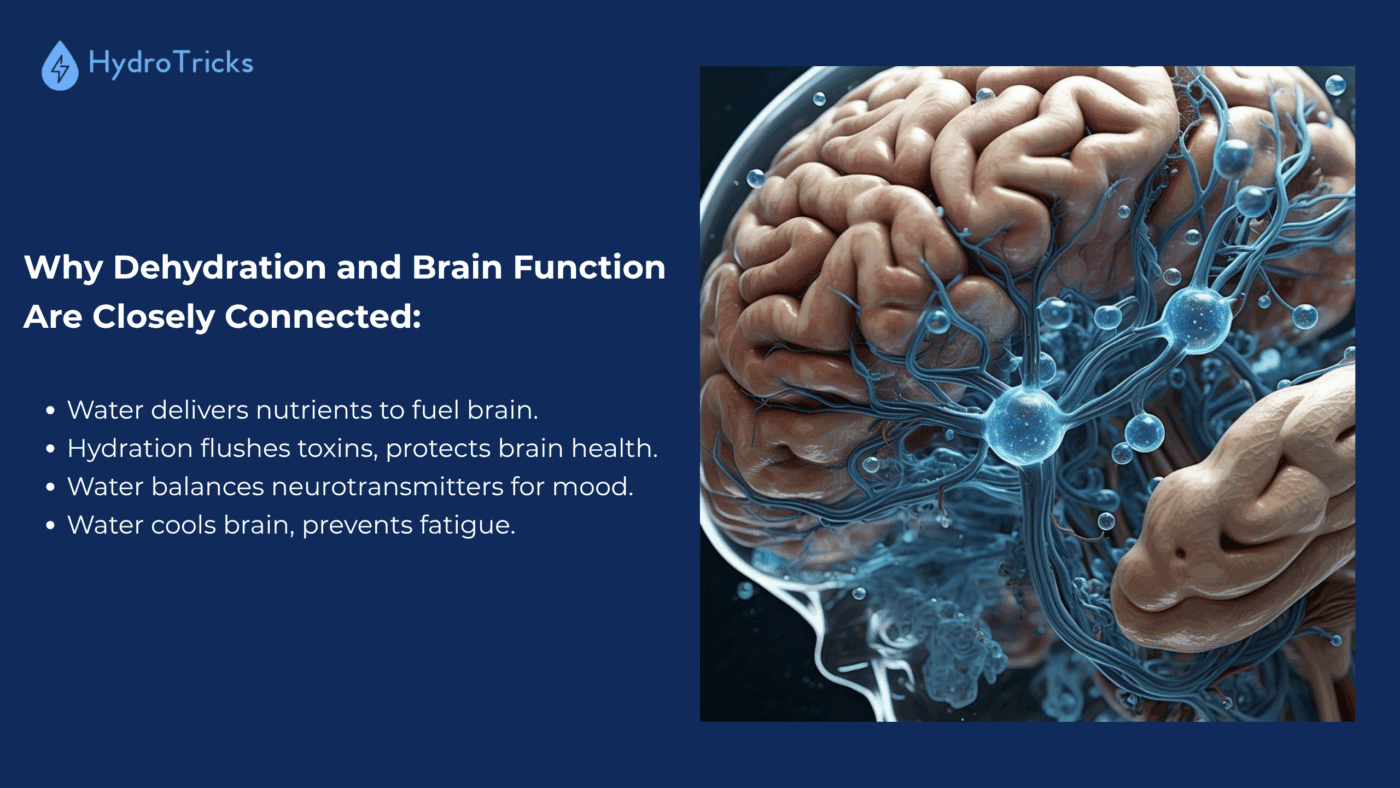
Water and brain function are intricately linked. Water is more than just a thirst-quencher—it’s a vital nutrient that powers nearly every function in the brain. Your brain is approximately 75% water, and even mild dehydration can disrupt its ability to function optimally. Let’s break down why hydration is so crucial to cognitive health:
- Nutrient Delivery: Water acts as a transport system, delivering essential nutrients like glucose and oxygen to brain cells, ensuring they have the fuel they need to work efficiently.
- Waste Removal: Proper hydration helps flush out toxins and metabolic waste from neural tissues, protecting the brain from damage.
- Neurotransmitter Balance: Water is essential in maintaining a stable environment for neurotransmitters—the brain’s chemical messengers that control mood, memory, and thinking.
- Temperature Regulation: The brain generates heat while processing information. Water helps regulate internal temperature, preventing overheating and mental fatigue.
When you’re dehydrated, all of these systems begin to falter. You may experience brain fog, slower thinking, and impaired concentration. The relationship between dehydration and brain performance is supported by mounting research. The conclusion is clear: dehydration and brain function cannot be separated—staying hydrated is one of the simplest and most effective ways to support mental clarity, emotional stability, and overall brain health.
4 Major Cognitive Effects of Dehydration on the Brain
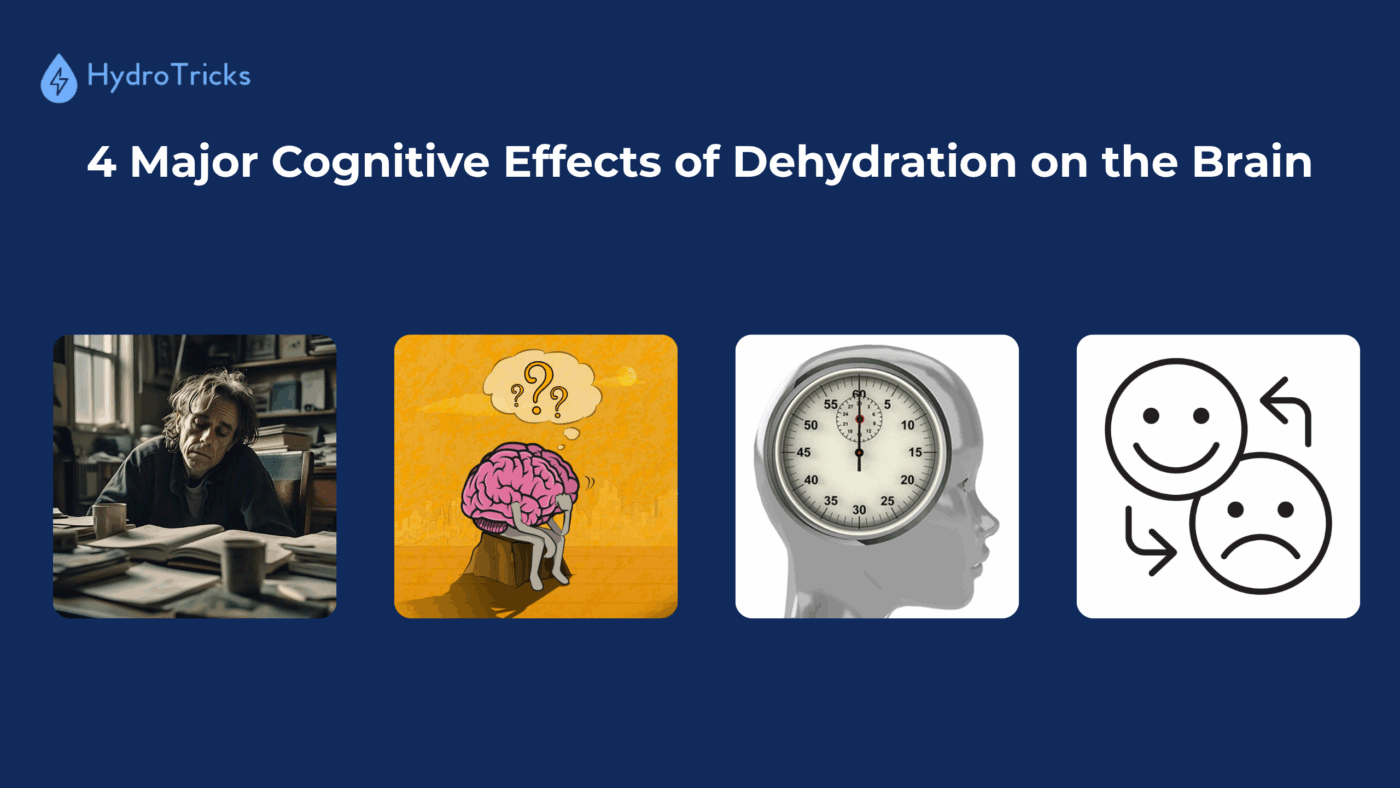
The relationship between dehydration and brain function becomes glaringly obvious when you look closely at the symptoms. Even mild dehydration can significantly affect your cognitive abilities and overall mental performance. Here are four key ways dehydration and brain health are intertwined:
Reduced Concentration and Alertness
Even a small drop of 1–2% in hydration levels can cause a noticeable decline in focus and alertness. When dehydrated, your brain struggles to maintain mental agility, leading to slower thinking and difficulty concentrating. This is a classic sign of how dehydration and brain efficiency are closely linked.
Impaired Short-Term Memory
Water is essential for memory function. Dehydration and brain fog go hand in hand, making it harder to retain new information or recall recent events. Forgetting names, dates, or instructions becomes more common. This illustrates how water and brain function impact everyday life.
Slower Reaction Time
A dehydrated brain processes information more slowly, which means your reaction times suffer. This is another example of how dehydration and brain response time are negatively impacted.
Mood Swings and Anxiety
Dehydration also impacts brain chemistry linked to emotional regulation. Low water levels can trigger mood swings, irritability, and heightened anxiety. Emotional balance depends heavily on the connection between dehydration and brain chemistry.
Understanding these effects shows just how critical hydration is to protecting your brain’s well-being. Don’t underestimate the relationship between brain and water—it’s key to your health.
Spot the Signs: Is Dehydration Impacting Your Brain?
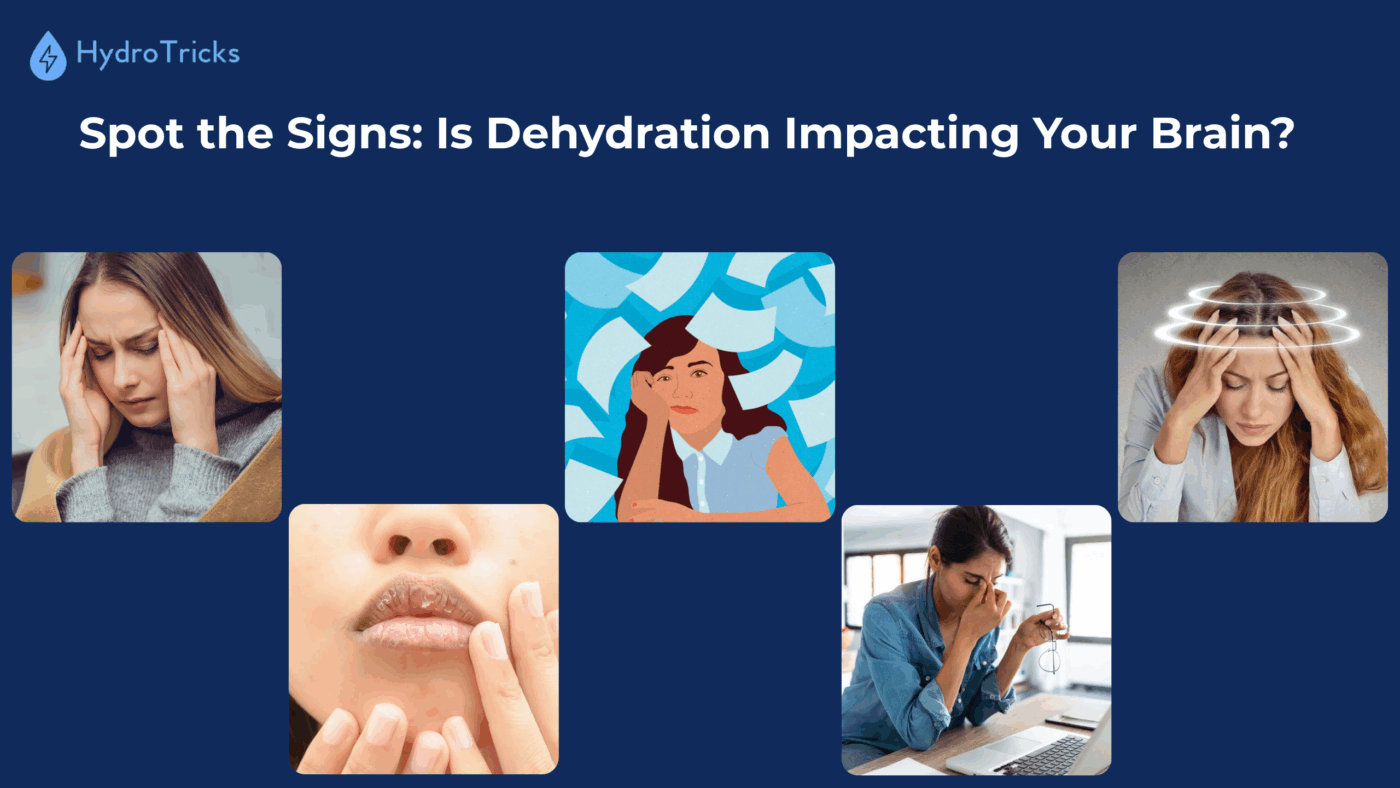
Thirst is the body’s most obvious signal that you need water, but it’s often too late—by the time you feel thirsty, mild dehydration may already be affecting your brain. Recognizing the subtle signs that dehydration is impacting your brain health is crucial for staying sharp and balanced.
Here are key symptoms to watch for:
- Headaches or Temple Tension: Dehydration can cause blood vessels in the brain to constrict, leading to persistent headaches or a tight feeling around your temples.
- Mental Fatigue and Mid-Day Energy Crashes: Feeling unusually tired or mentally drained during the day is a common sign your brain isn’t getting enough water.
- Difficulty Focusing or Learning: Struggling to concentrate or retain new information often points to dehydration interfering with cognitive function.
- Dizziness or Lightheadedness: Reduced fluid levels can lower blood pressure and oxygen flow to the brain, causing balance issues or faintness.
- Dry Eyes and Mouth: These physical signs reflect overall fluid loss, which affects brain and water balance too.
- Dark-Colored Urine: This indicates concentrated urine and insufficient hydration.
- Irritability and Stress Sensitivity: Dehydration can disrupt brain chemistry, increasing feelings of anxiety or mood swings.
If you notice several of these symptoms regularly, your brain and overall health could be compromised due to dehydration. Staying ahead by hydrating consistently can help maintain mental clarity and emotional stability.
Water and Brain Function: How Much Is Enough?
The general advice of eight glasses a day is outdated. Newer guidelines suggest:
- Men: 3.7 liters (125 oz) daily
- Women: 2.7 liters (91 oz) daily
You don’t need to rely solely on water; foods like watermelon, cucumbers, oranges, and soups also contribute. However, water is still the best and most direct way to support hydration and brain function.
5 Smart Ways to Support Brain Health Through Hydration
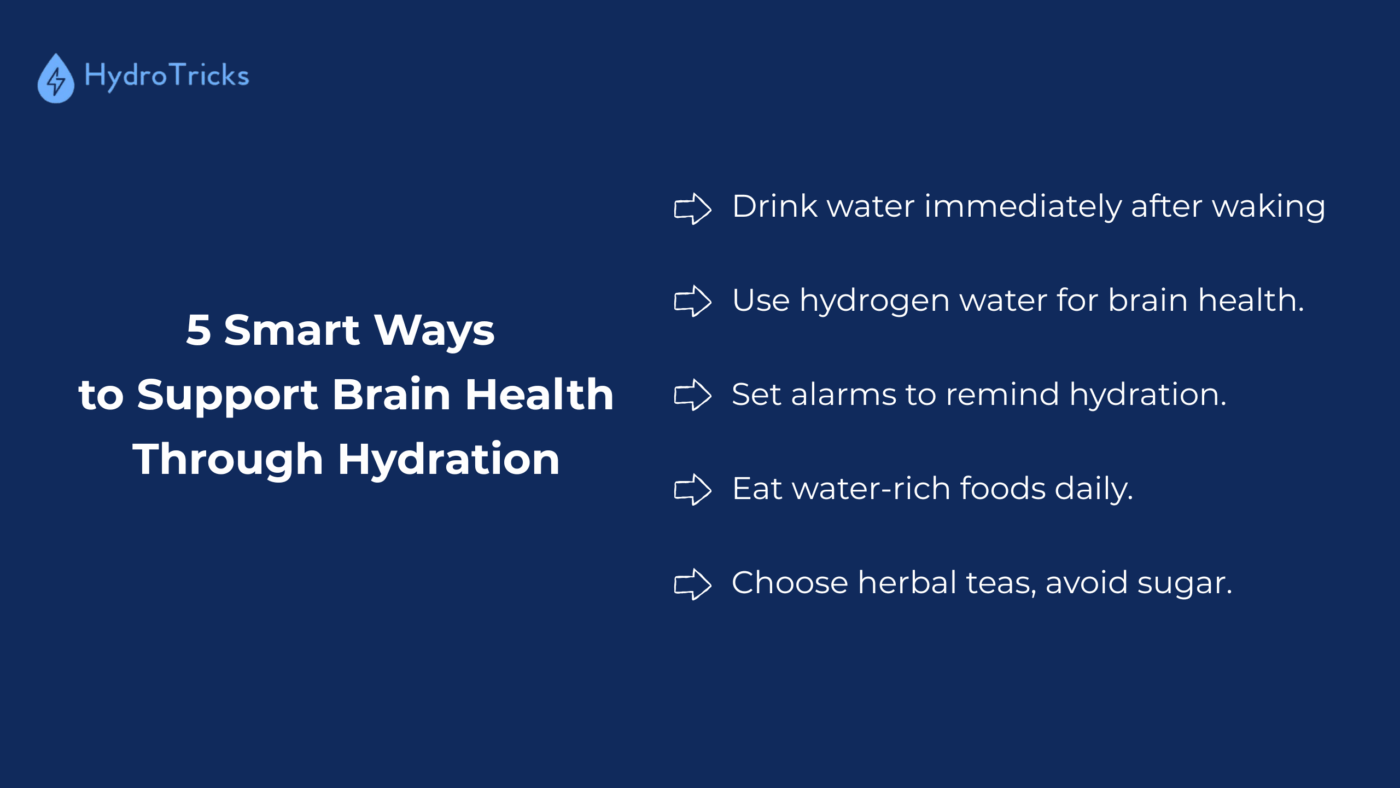
1. Start Your Day Right
Drink a glass of water within 10 minutes of waking up. It rehydrates your body and jumpstarts your brain after hours without fluids.
2. Use a Hydrogen Water Bottle
Hydrogen-infused water offers antioxidant properties that can support both cellular and brain health. In 2025, hydrogen water bottles are among the top wellness tools to combat dehydration and brain stress.
3. Set Hydration Reminders
Use a smartphone app or simple alarms to prompt regular water intake. This is especially useful for students, professionals, and seniors.
4. Eat Your Water
Include hydrating foods in your meals. Leafy greens, fruits, and soups do double duty by nourishing the body and supporting hydration.
5. Choose Brain-Friendly Beverages
Ditch sugary drinks and sodas. Choose herbal teas, coconut water, or electrolyte-infused water to support hydration and brain vitality.
Hydrogen Water: A Next-Level Hydration Boost for Your Brain
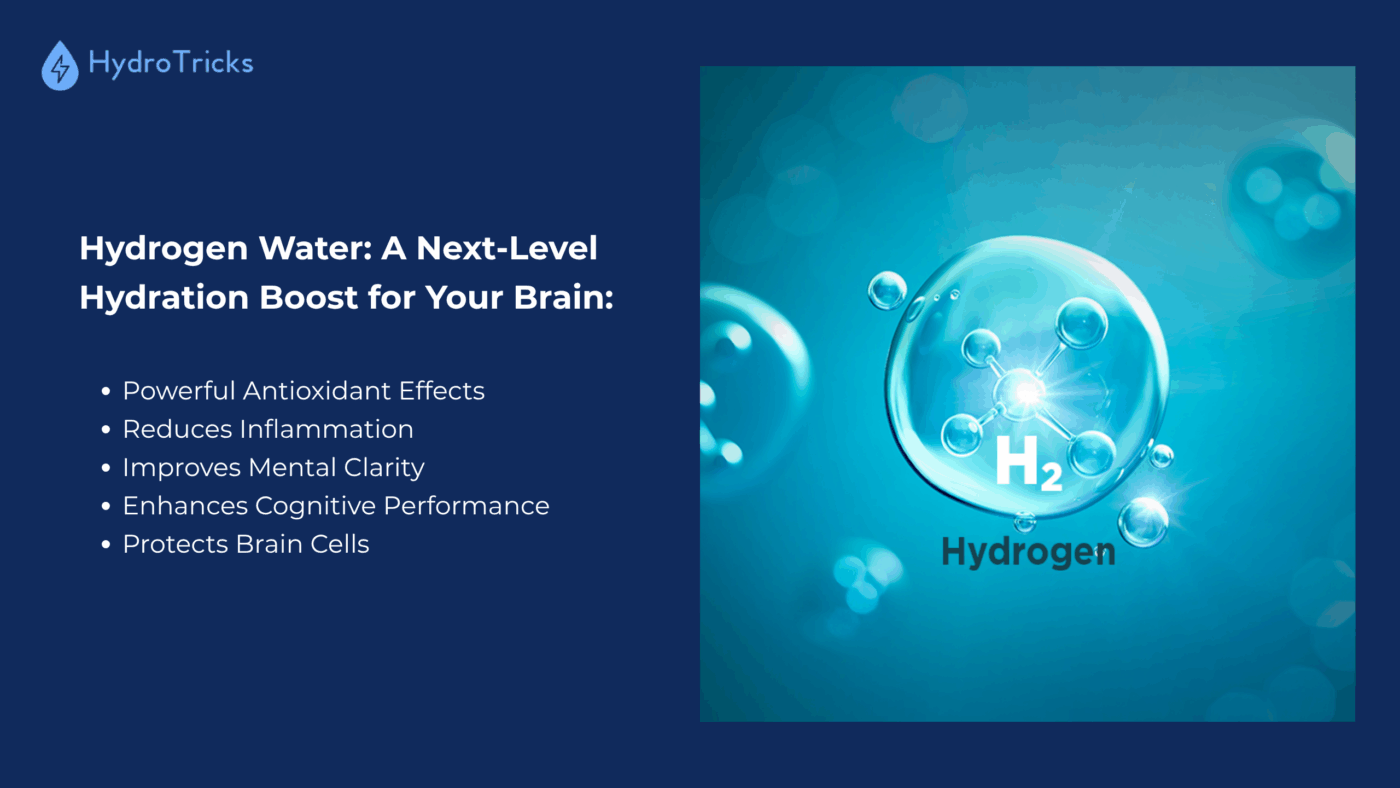
Hydrogen water is becoming a popular choice in 2025 for those seeking to enhance hydration and brain function. Infused with molecular hydrogen, this special water offers several key benefits for brain health:
- Powerful Antioxidant Effects: Neutralizes harmful free radicals that contribute to oxidative stress and brain aging.
- Reduces Inflammation: Helps lower inflammation levels that can impair cognitive function.
- Improves Mental Clarity: Supports sharper focus and better concentration throughout the day.
- Enhances Cognitive Performance: May boost memory retention and reaction times.
- Protects Brain Cells: Shields neural tissue from damage caused by toxins and stress.
Drinking hydrogen water regularly can support your brain at the cellular level while keeping you properly hydrated. Using a hydrogen water bottle makes it easy to enjoy these benefits anytime, helping you maintain optimal brain and water balance.
Best Tool: HydroWata Hydrogen Water Bottles

This innovative HydroWata hydrogen water bottle isn’t just about hydration—it’s about elevating brain health. Here’s why HydroWata is gaining traction in 2025.
Key Features:
- High Hydrogen Output: Delivers 1.1–1.68 PPM of hydrogen for brain-boosting antioxidant support.
- Auto Shut-Off: Built-in timer ensures optimal hydrogenation with no guesswork.
- Ergonomic Design: A wide-mouth opening makes drinking and cleaning easy.
- Premium Build: Durable, chemical-free glass ensures pure water every time.
Health Benefits:
- Enhances gut health, which is intricately tied to the brain
- Reduces oxidative stress and inflammation, helping your brain perform better
- Improves skin health—a bonus for those seeking inside-out wellness
Why Choose HydroWata?
- Advanced SPE Technology: Generates pure hydrogen without harmful byproducts like chlorine
- 1000mAh Rechargeable Battery: Long-lasting power for hydration on the go
- No Toxins, No Metals, No Contaminants: Just clean, hydrogen-rich water
Simple 3-Step Process:
- Pour filtered or mineral water (avoid distilled)
- Press the button to start hydrogenation
- Drink directly from the elegant glass bottle
HydroWataisn’t just another bottle. It’s a smart tool for those serious about hydration and brain optimization.
Curious about how HydroWata performs in real life? Check out our full review: Hydrowata Hydrogen Water Bottles Review: Are They Worth It?
Conclusion: Hydrate for a Healthier Brain in 2025
The link between dehydration and brain function is undeniable. If you want sharper thinking, improved memory, better emotional balance, and reduced stress, water should be your daily priority. Simple habits—like using a hydrogen water bottle, eating water-rich foods, and setting hydration reminders—can make a profound difference in your mental clarity and overall well-being. In 2025, investing in your brain starts with the basics. Hydration is a low-cost, high-impact step toward a healthier, more focused life. Don’t underestimate the power of water. Dehydration and brain dysfunction don’t have to be part of your routine—drink smarter and thrive. Your brain will thank you.
FAQs
Can dehydration cause long-term brain damage?
While short-term effects are often reversible, chronic dehydration can contribute to cognitive decline, especially in older adults.
How quickly does dehydration affect the brain?
Mental fog, fatigue, and irritability can occur within hours, especially after heat exposure or physical exertion.
Are sports drinks better than water for brain hydration?
Water is usually best for everyday hydration. Sports drinks can help after intense exercise but often contain added sugars.
Where can I buy the hydrogen water bottle?
HydroWata hydrogen water bottles are available on the official HydroWata website. They offer multiple models designed for convenience, performance, and health support. Look for bundle deals, customer reviews, and certifications to make a confident purchase.

